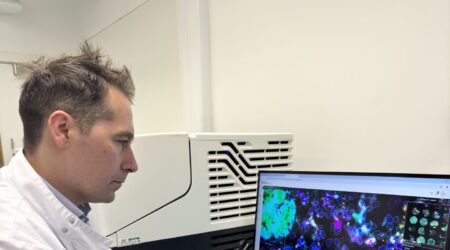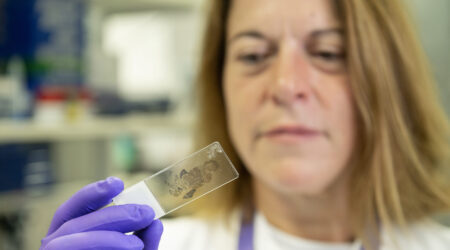Researcher: Dr Vladimir Teif
Location: University of Essex
Date: Autumn 2024
Project status: Ongoing
Developing a blood test for the early detection and monitoring of pancreatic cancer
The challenge
Early detection saves lives. However, the symptoms of pancreatic cancer are vague, making it incredibly difficult for GPs to distinguish it from other less serious conditions. As a result, 80% of people with pancreatic cancer are diagnosed too late. Developing new tools to improve the detection of pancreatic cancer would mean that more people are diagnosed earlier, giving them the chance to have life-saving treatment.
The development of tests that can be used by GPs to identify people who may have pancreatic cancer so that they can be urgently referred for further investigations is currently a very active area of research.
Blood tests look for biological markers in the blood that are linked to disease. They have the potential to detect pancreatic cancer in its earliest stages and are minimally intrusive. However, they also need to be very accurate to be useful in the clinic.
The project
In this project, Dr Vladimir Teif and his research team aim to develop an accurate and affordable blood test to detect early-stage pancreatic cancer, based on a new approach that measures small pieces of DNA in the blood.
DNA is the genetic material that is be found inside every cell of the body, including healthy and cancer cells. When cells die, they cut their DNA into small pieces and release it into the blood. The way that healthy cells and cancer cells cut their DNA is slightly different, and so too are the pieces of DNA they release into the blood.
This blood test aims to pick up differences between the DNA released by healthy cells and cancer cells and use these to detect the presence of pancreatic cancer. Dr Teif is aiming to develop a test that can pick up DNA changes that are present in very small amount in the blood, so that it can detect pancreatic cancer at the earliest possible stage.
This type of test, which looks for pieces of tumour DNA or tissue in the blood rather than taking a sample of the tumour itself, is called a liquid biopsy and has the advantage of being less invasive than a traditional biopsy.
Dr Teif’s team will study changes in the DNA fragments released into the blood by pancreatic cancer cells and healthy cells at different times. They plan to develop a prototype computer software to help diagnose patients based on the specific patterns of DNA fragments that can be detected in blood samples.
The team have already successfully used this technique in brain, breast and blood cancer and have some exciting early findings showing differences in DNA released into the blood between pancreatic cancer patients and healthy individuals. The challenge they will face in this project is whether they can also achieve these results in the very early stages of pancreatic cancer.
The hope
Dr Teif and his team hope that this blood test could be used to detect pancreatic cancer at an earlier stage, when there are more treatment options and a better chances of survival.
If this project shows that it is possible to develop an accurate test to detect pancreatic cancer based on DNA fragments in the blood, Dr Teif plans to work with NHS collaborators to quickly move the test into clinical trials.
We are developing a new generation of diagnostic tests, so called liquid biopsies, based on the recognition of DNA patterns in blood using advanced computational methods. This aims to achieve more sensitive and affordable tests for the early detection of pancreatic cancer.




